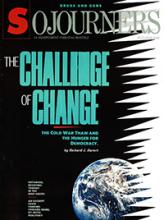Recently the rest of the world discovered what those of us who live in the middle of it have known for years: There is a Washington, D.C., that is geographically close to, but by every other indicator at the other side of the world from, the power center that usually makes headlines. In recent months this other Washington has stolen much of the attention, as reports in major newspapers and magazines, and television documentaries with titles such as State of Emergency and Murder Capital USA, offer graphic portrayals of life on the streets of the nation's capital.
In the first days of April, The Washington Post published a front-page series called "At the Roots of the Violence." The second installment outlined the "code of conduct" of the streets' drug dealers, who have been both source and target of most of the violence: "Never back down.... Be willing to kill or die to defend your honor.... Protect your reputation and manhood at all costs...." Those who best follow this code are known in street language as "soldiers." One of them answered a reporter's question about why they are so ready to shoot: "I guess it's greed for that money."
Following the printed code of conduct in the newspaper was this observation: "It is a way of behaving that flies in the face of traditional American values."
Read the Full Article

